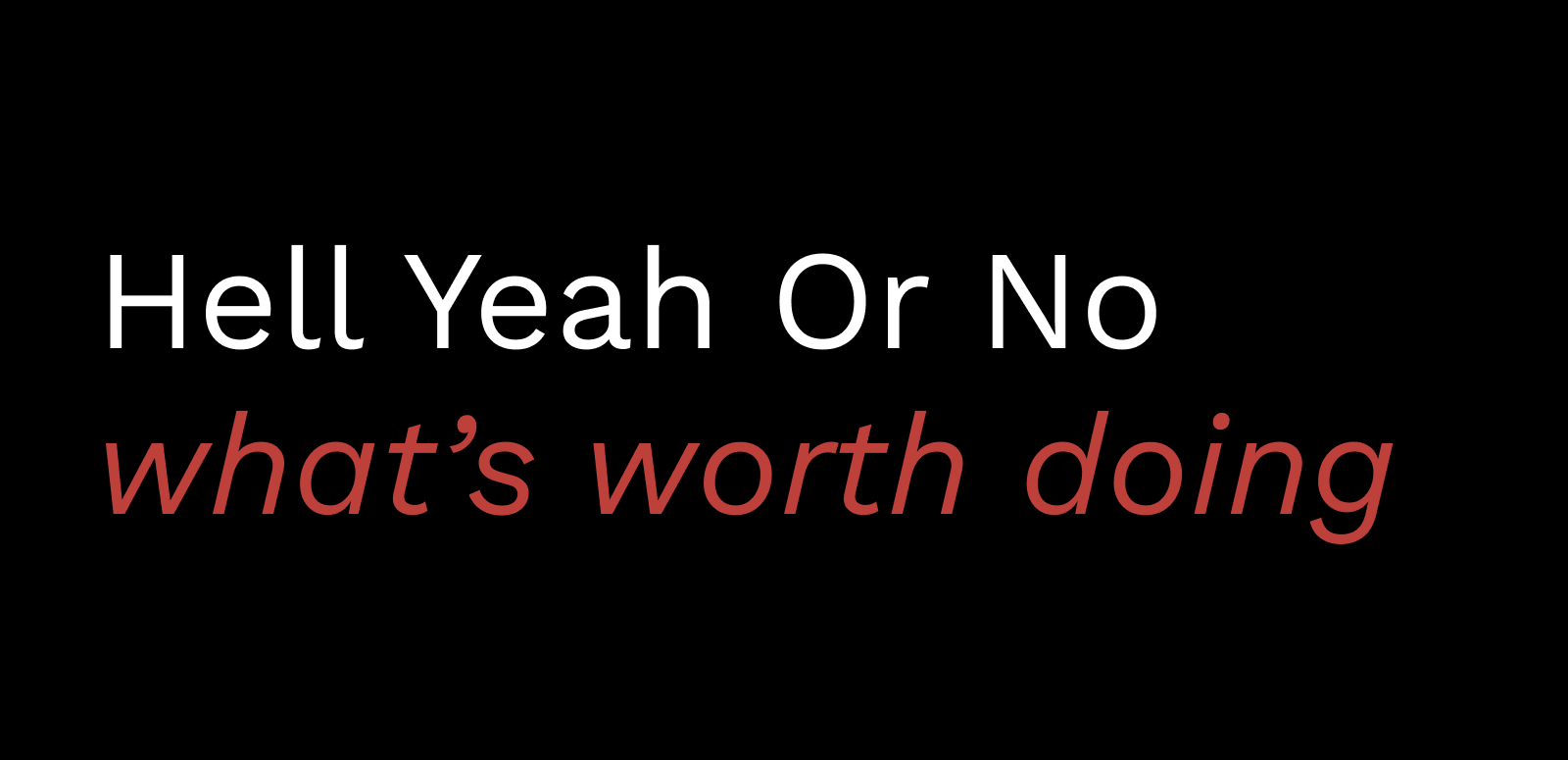I just finished reading Derek Sivers’ book Hell Yeah or No: What’s Worth Doing.
It’s fantastic and you should check it out.
Following are some of my favorite excerpts from the book…
No matter what you tell the world or tell yourself, your actions reveal your real values. Your actions show you what you actually want. (p. 9)
Before you start something, think of the ways it could end. Sometimes the smart choice is to say no to the whole game. (p. 39)
My unwritten condition for when to exercise was this:
When it’s a nice day, and I’ve finished my work, and I haven’t just eaten, and I’m feeling energetic.
But of course that rarely happens, so I wasn’t exercising enough.
My coach suggested I change “and” to “or.”
When it’s a nice day, or I’ve finished my work, or I haven’t just eaten, or I’m feeling energetic.
Now I exercise quite often. (p. 59)
When people say they have only two options, it means they got stuck. Once people get two options, they start comparing the pros and cons of those two, and forget to think of more. (p. 60)
Most people overestimate what they can do in one year, and underestimate what they can do in ten years. (p. 66)
What are the odds of winning the lottery? Fifty million to one? Ah, but that’s if you’re being egocentric and thinking only of yourself! Someone always wins it. So what if you look past yourself and ask, “What are the odds that this rare thing will happen to someone?” Almost 100 percent.
That’s a nice reminder when the odds seem impossible. Amazingly rare things happen to people every day. (p. 75)
Most musicians first record songs in the studio, then go perform them in concert. Fela Kuti did the opposite. He performed only new unrecorded songs in concert. Then once he recorded them in the studio, he’d never perform them again. I couldn’t help but notice the similarity. It’s as if to him, the recording was the end of the life of a song, instead of the beginning. It makes just as much sense if you think about it that way. (p. 76)
Do something for love and something for money. Don’t try to make one thing satisfy your entire life.
Each half of your life is a remedy for the other. You get paid stability for part of your day, but then need creative time for expression. So you push yourself creatively, expose your vulnerable art to the public, feel the frustration of rejection and apathy, and then long for some stability again. Each half is a remedy for the other. (p. 86)
Learning without doing is wasted. If I don’t use what I learn, then it was pointless! How horrible to waste those hundreds of hours I spent learning, and not turn it into action. Like throwing good food in the trash, it’s morally wrong. (p.90)
(Btw, For The Interested will help you take action each week.)
A new college campus was built, but one thing was still debated: Where in the grass should we put the paved walkways? Some people thought the walkways should go around the grass, to leave it green. Some thought the walkways should cut across diagonally.
One professor had the winning idea: Don’t make any walkways this year. At the end of the year, look where the grass has worn away. That shows where the students are walking. Then just pave those paths. (p. 92)
John Cage said, “I can’t understand why people are frightened of new ideas. I’m frightened of the old ones.” (p. 100)
The least successful people I know run in conflicting directions, are drawn to distractions, say yes to almost everything, and are chained to emotional obstacles.
The most successful people I know have a narrow focus, protect themselves against time-wasters, say no to almost everything, and have let go of old limiting beliefs.
More people die from eating too much than from eating too little. (p. 103)
If you dug the above excerpts, you can get the book here.
For more actionable ideas and inspiration, check out my For The Interested newsletter.
